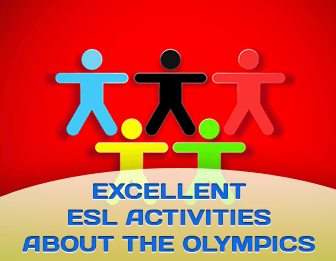
With the Olympics in London coming up very soon, it is time to start thinking about how you would like to use this major event in your ESL classes. The Olympics are an excellent ESL topic not only because of the different ways you can address it but also because of how popular the event is around the world.
Regardless of where you teach, students will most likely be aware of the Olympics and may even be watching the events on TV, reading about them in the paper, or keeping track of them online. Whereas some sporting events are popular more with male or female students, the Olympics appeal to both and are appropriate for all age levels too. In preparing for an Olympics themed lesson or lessons, it might be a good idea to survey your students to see how much they already know and where their interests lie. The results of the survey can help you decide what types of activities to do and what topics to focus on. Below are some ideas to help you get started with your Olympics lesson plans.

Try These Excellent ESL Activities about the Olympics
-
1
Lower Levels
To practice simple sentence structures you can create an Interview or Find Someone Who worksheet. For both of these, students will mingle repeatedly asking their peers a predetermined question such as "What's your favorite sport?" or questions like "Do you like basketball/gymnastics/tennis?" and recording responses on their worksheets. Students should also respond using the appropriate structure, in the cases above "I like soccer" or "My favorite sport is soccer" and "Yes, I do" or "No, I don't", when asked questions by their classmates. This is a beginning level activity to practice basic listening and speaking exchanges and is a more enjoyable way to drill particular structures. You can also make a race out of this activity by rewarding the students who complete the worksheet quickly or within a particular time limit.
For lower level students, reading material will likely have to be heavily adapted but you can tailor the vocabulary and grammar to best suit your students. You can then read the short story or article as a class. If you would like to cover a specific teaching point or language skill, you can also draw students' attention to it in the passage you use, practice it using another task, and then ask students to use it in their own speaking or writing. When reading with low level students, images can significantly aid comprehension and are therefore highly recommended. If you choose to make flashcards for important new vocabulary words, you can use the same images as the ones in the story.
Just for fun, word searches or crosswords can be included on Olympics handouts too (try BusyTeacher’s FREE Word Search Creator!). These can be especially good for lower level learners as a way to introduce or review vocabulary related to a particular topic and can be completed individually, in pairs, or in groups. As extra sections on worksheets, these types of activities also provide students who finish their work quickly with something enjoyable, yet academic, to do while others continue working. Since students all progress at different paces, it is always a good idea to have small mini tasks available to fall back on.
-
2
Higher Levels
Intermediate to advanced students could write, edit, and deliver speeches about a favorite sport, a famous athlete, the importance of international sporting events, or even a sports related event from their childhood. Depending on the age of your students, research might be required but this could be done just as easily without research especially if students want to focus on their own achievements in sports or hobbies. If your classes are quite large, you could have students peer edit the speeches in small groups before marking them yourself and then have students present the polished product to groups rather than to the whole class. When doing speeches in class, students should always be required to give their peers feedback after each presentation as this encourages active listening and can help students notice important features of good speeches. The feedback sandwich, that is where a positive comment is followed by constructive criticism and then another positive comment, is a common approach to peer feedback which eliminates unproductive comments.
With intermediate and advanced students, you could facilitate a short discussion about athletes in general, have the class listen to an interview with an Olympic athlete and answer comprehension questions, and finally discuss the content of the interview. This can really involve all four skills and can also be conducted with a focus on reading, rather than on listening, if the interview is transcribed. A transcription would make the activities easier for intermediate and upper-intermediate students whereas the listening focus might serve to challenge advanced students. Using a transcription and recording together would be another possible option and is probably best as students all learn differently and have various strengths and weaknesses.
For listening and speaking practice set up a debate. To do this divide the class into two large groups or have students work in pairs. Topics might include whether or not international sporting events serve an important role in society today or whether or not highly paid athletes deserve the amount of money they make. You could also just choose a highly respected athlete, it is best when the athlete is from the country you are teaching in, and ask students to debate whether or not that athlete is the best athlete of all time. Other topics would serve equally well for debates. It is usually best to have several topics available in case one does not generate conversation as well as you would have liked. If students have done debates in class before, they should be familiar with the format which is really ideal for improving speaking fluency and active listening. If students are debating in teams or groups just be sure to have students take turns speaking so that everyone participates.
For more of a focus on reading, choose an article or adapt one about the Olympics or a particular sport or athlete that students can read either in class or as homework. An accompanying worksheet with comprehension and discussion questions can better prepare students to discuss or debate their ideas in class once they have gotten everything worked out on paper. Students who are quiet during discussions or debates often have just not worked through their opinions or what they want to say quickly enough to contribute so these foundation activities will help engage more students in these speaking activities.
-
3
All Levels
For role plays, students could pretend to be an athlete, real or imagined, and answer interview questions asked by peers. This would be especially productive if some of the questions are known in advance and if students have also observed interviews given by athletes in the past either in class or at home.
Students could be encouraged to write letters to famous athletes wishing them good luck in the upcoming games or explaining how they have inspired others. These letters could be quite short and simple, even taking the form of cards for lower levels, or long and more complex depending on your students and what you want them to achieve through this assignment.
Take a virtual fieldtrip either to Olympia or to London! If you want to focus on the origin of the Olympics, Olympia is a good place to start. Meanwhile, students, most of whom will likely not be attending the events in person, will love the chance to see what all the hype around London is about too. It is amazing to see what a huge impact hosting the Olympics can have on a city which can also be a subject for discussion. Short of taking a virtual fieldtrip, you can use an adapted London map and Olympic venues to teach such topics as directions.
You can host a school wide version of the Olympics with a focus on English by having a speech competition or spelling bee. Representatives from each class could be chosen to compete at different grade levels and then at a school wide level or there could be different events for each grade level. Students could even be encouraged to select class colors and wear them throughout the competition! Scores could be delivered in a way similar to Olympic gymnastics events and gold, silver, and bronze medals could be given to the winners. If cooperative events are more suitable, consider a spelling relay where teams of students compete rather than just individuals. While a little competition can be a good thing, it is important to keep these activities fun and enjoyable for everyone.
The Olympics are a really interesting topic and there are tons of ESL activities that you can do related to the Olympics and sports in general.
For even more ideas, search Busy Teacher for related worksheets and materials. Just remember to consider your students' interests when planning these special activities and have fun!
P.S. If you enjoyed this article, please help spread it by clicking one of those sharing buttons below. And if you are interested in more, you should follow our Facebook page where we share more about creative, non-boring ways to teach English.







